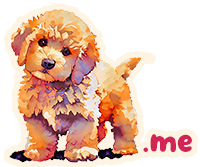Going to a new home is often a big event! Some puppies do not skip a beat in their homes and are overcome with excitement and joy. Other puppies can be uncomfortable, disoriented, or stressed in a new home. Below we have outlined the procedures we believe to be best when helping an unsure puppy adjust to a new family and environment.
Prepare a Cozy Environment
Before the puppy comes home, prepare a confined space in a quiet area of the home. This space should be confined using a play pen, with enough room to comfortably fit a small dog bed, a potty area, food and water.
We do not recommend using disposable puppy pads, as the plastic texture is enticing to chew up, and a hazard to ingest. We recommend a small indoor turf patch or reusable puppy pads. (*Ask your breeder if they carry any of our Reusable Puppy Pads for you to purchase.)
Let the Puppy Decompress With Plenty of Food!
A sensitive or uncomfortable puppy should go to their playpen with food and water immediately after coming home. If the puppy seems shy, disoriented, or stressed, please allow them to decompress alone for a minimum of 4-8 hours in this quiet space. They should have 24 hour access to appetizing soft food (such as the Cesar’s Wet food in your puppy pack), water, and their blanket that smells like home.
Take Things Slow
Check on the puppy every 1-2 hours during the daytime. Speak encouragingly and in soft tones. Pet, pick up, and play with the puppy for short periods of time. Introduce family members one person at a time into the quiet area, remaining calm, soothing, and loving thorough the introductions. Keep interactions short and encouraging. Other dogs in the household can often provide a sense of direction and comfort for a shy puppy. You may see your puppy ‘liven up’ when introduced to the other dogs. That is a good thing, but we still want to limit interaction between the any other dogs during the transition. Our #1 priority is establishing a bond between the human family and the animal!
Recognizing Types of Stress in a Puppy
Stress may present itself subtly or overtly, this list will help you identify when your puppy may be stressed. It is important to work with your puppy to reduce his/her stress, but also to break-through stress and show them that everything is OK. Most puppies will naturally warm up in 1-4 days, with 24 hours being the most common amount of time it takes for a puppy to warm up to their new environment and family.
- Stiffening Up or Freezing
- Tucked tail
- Tucked ears
- Excessive Lip licking
- Avoiding eye contact
- Panting
- Excessive Yawning or Drooling
- Hiding
- Whining
- Pacing
- Upset Stomach and Diarrhea or Bloody/Mucus Stool (Please See Our Article on Loose Stool to Determine what is Normal vs Abnormal when accessing your puppy’s poo!)
Why do all this?
Why do we suggest taking a slow and soothing approach? Disorientation in a new environment can lead to decrease appetite, which can develop into hypoglycemia (low blood sugar). Hypoglycemia can be deadly.
Symptoms of Hypoglycemia
- Lack of appetite
- Lack of energy/lethargy
- Vomiting
- Disorientation/weakness/ “star-gazing”
- Tremors/seizures
- Fainting, loss of consciousness, coma
Treatment of Hypoglycemia
Treatment will depend on the severity of the situation. For pets with minimal symptoms, oral glucose may be sufficient, such as feeding the puppy nutrical, honey, or corn syrup. For moderate to severe symptoms, your pet will likely be admitted to the hospital for care, which will, at a minimum, consist of intravenous (IV) fluid therapy that contains a sugar called dextrose to help bring your pet’s blood sugar up, even if it’s not eating. Additional treatments may be needed based on the initial cause of your pet’s hypoglycemia.
Overnight
A sensitive or shy puppy would do best NOT to be crated during the first few days home. Have the puppy sleep in their playpen overnight with soft bedding, access to a potty area, water and food. Your puppy may sleep more during the day and be more active at night. It is common for this transition period to last up to a week.
When can a Structured routine Begin?
When your puppy is comfortable in their new environment, they will begin to recognize you as their family! Signs they are comfortable with you include:
- Wagging their tail.
- Perking up at the sound of your voice.
- Initiating interaction: Barking, Playing, Greeting, Licking or nipping at you in a friendly manner.
- Rolling over on their belly.
Now that the puppy is comfortable it is time for the real work to begin! Please do not neglect socialization or confidence building with puppies, it will be critical for the puppy to begin making positive and structured associations early in life, to set both you and your puppy up for success long term.
When the puppy is comfortable with their new family and environment, it is time to establish a schedule and routine. This routine should include pottying training, crate training, basic manners and socialization!
